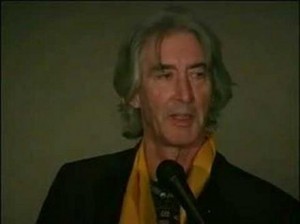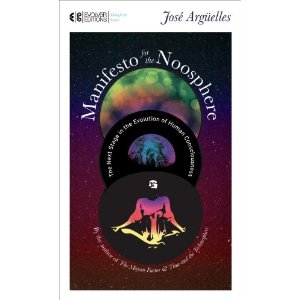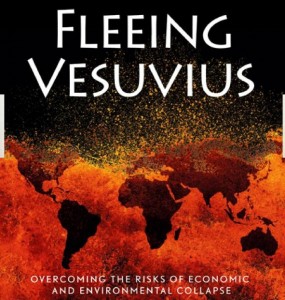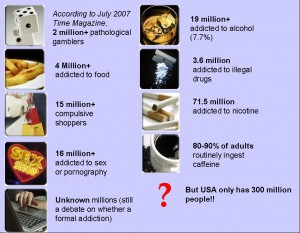And the conversation at P2P Foundation, Tip of the Hat to Sepp Hasslberger.

Phi Beta Iota: We reproduce the excerpt in order to add links to all of the books and individuals mentioned. Tip of the Hat to Reality Sandwich for this offering, and to Evolver Editions (North Atlantic/Random House) for their new Manifesto series in support of human consciousness and planetary synthesis.
Noosphere: The Next Stage in the Evolution of Human Consciousness, A Testimony

To mark the recent passing of José Argüelles, we offer an excerpt from his upcoming book Manifesto for the Noosphere: The Next Stage in the Evolution of Human Consciousness, available from Evolver Editions/North Atlantic Books in October 2011.
EXCERPT:
We must enlarge our approach to encompass the formation taking place before our eyes … of a particular biological entity such as has never existed on earth-the growth, outside and above the biosphere, of an added planetary layer, an envelope of thinking substance, to which, for the sake of convenience and symmetry, I have given the name of the Noosphere. –Pierre Teilhard de Chardin, The Future of Man

Manifesto for the Noosphere is the result of forty years of study, contemplation, investigation, and synthesis. While the noosphere may be beyond the grasp of conventional science, it is a deep and pervasive intuition that has gripped the minds of scientists, philosophers, poets, and artists since the concept first emerged in 1926. It is an evolutionary concept posited by studies in both biogeochemistry and paleontology. It is a whole-systems paradigm that melds prophecy and analysis of current world trends. It is a perception that the transformation of the biosphere is inevitably leading to a new geological epoch and evolutionary cycle, and it is due to the impact of human thought on the environment that this new era — the Noosphere — is dawning.

The psychological roots of resource over-consumption
Nate Hagens, 11 May 2011
Chapter from Fleeing Vesuvius
Humans have an innate need for status and for novelty in their lives. Unfortunately, the modern world has adopted very energy- and resource-intensive ways of meeting those needs. Other ways are going to have to be found as part of the move to a more sustainable world.
Phi Beta Iota: Buckminster Fuller understood the centrality of time/energy, but he did not grasp the psychological roots of collective self-destruction. This is an extraordinary article in every possible way. Strategic Analytics & Smart Nations are a solution.

Wikipedia on Anhedonia:
In psychology and psychiatry, anhedonia (< Greek ἀν- an-, “without” + ἡδονή hēdonē, “pleasure”) is defined as the inability to experience pleasure from activities formerly found enjoyable, e.g. hobbies, exercise, social interaction or sexual activity.
Anhedonia can be a characteristic of mental disorders including mood disorders, schizoaffective disorder, schizoid personality disorder and schizophrenia. Affected schizophrenic patients describe themselves as feeling emotionally empty.[1]
Mood disturbances are commonly observed in many psychiatric disorders. Disturbing mood changes may occur resultant to stressful life events and they are not uncommon during times of physical illness. [2] While anhedonia can be a feature of such mood changes, they are not mutually inclusive.

“When even one American – who has done nothing wrong – is forced by fear to shut his mind and close his mouth, then all Americans are in peril. ” – Harry S. Truman
“Those who desire to give up freedom in order to gain security, will not have, nor do they deserve, either one” – Thomas Jefferson
“When governments fear the people there is liberty. When the people fear the government there is tyranny.” – Thomas Jefferson
“The only good is knowledge, the only evil is ignorance.” -Diogenes

America’s Core Values: We the People vs. Them Crooks
CURVEBALL: The Interview + Integrity RECAP
Journal: USA Slouching Toward Tyranny
Reference: Empire of Lies & Secrecy
Search: cost of corruption + Corruption RECAP

Open Source Politics and Religion
I just sent the following to an email list I’m on (Google Group Next Net), and thought it would be worth sharing here:
I’ve been involved with R.U. Sirius in instigating an International Open Source Party (version 2.0 – we tried it before but it didn’t quite launch). He wrote about it here. This article includes the principles I came up with for Open Source politics, which I include below. Open Source is not a religion, i.e. not based on faith in something that can’t be observed or experienced. It’s about transparency: when we apply the term Open Source we’re talking about following methods and processes in production and distribution such that whatever we define as “source code” can be observed and experienced, so to me it’s the opposite of religion. Eric Hughes once explained to me, when I was new to Open Source thinking, that a particular encryption tool should be Open Source so that its source could be examined and its effectiveness and integrity verified. Politics should be like this, and if we all insisted on this approach, religion would be transformed into practice (a la Buddhism and 4th Way) rather than dogma (a la much of Christianity).
Principles of Open Source Politics:
Openness
Many of us who are tech-focused have come to understand the power of open approaches and open architectures. Even technologies that aren’t strictly “Open Source” benefit from Open APIs and exposure of operating code (kind of inherent with scripting languages like Perl and PHP). When we know how something works, we know how to work with it. And we know how to transform it to meet our needs.
Government should be as open and transparent as possible. There may be some rationales for closed doors, but few — for the most part, citizens should be able to clearly see how decisions are made. That’s a key component of our political platform: we want to see the actual “source code” for the decisions that affect our lives.
Collaboration
Open Source projects are often highly collaborative and can involve many stakeholders, not just manager and coders. The Open Source Party sees this as a great way to do government. (I’m partial to charrette methodology, personally.)
Emergent Leadership
Effective action and decison-making requires leadership. In an Open Source form of politics, leaders emerge through merit -— by providing real leadership and direction, not by appointment, assignment, or election. Nobody made Linus Torvalds the lead for Linux, or Matt Mullenweg the lead for WordPress. They saw a need, created a project, and found an effective following who acknowledged their vision, expertise, and ability to manage and lead. Emergent leaders aren’t handed authority. They earn it, and if they cease to be engaged or effective, they pass the baton to other leaders who emerge from within the group.
Extensible and Adaptable
Open Source projects and structures are agile and malleable. They can be adapted and extended as requirements changed. Governance should have this kind of flexibility, and our system of governance in the U.S. was actually built that way. We should ensure that bureaucracies and obsolete rule sets don’t undermine that flexibility.